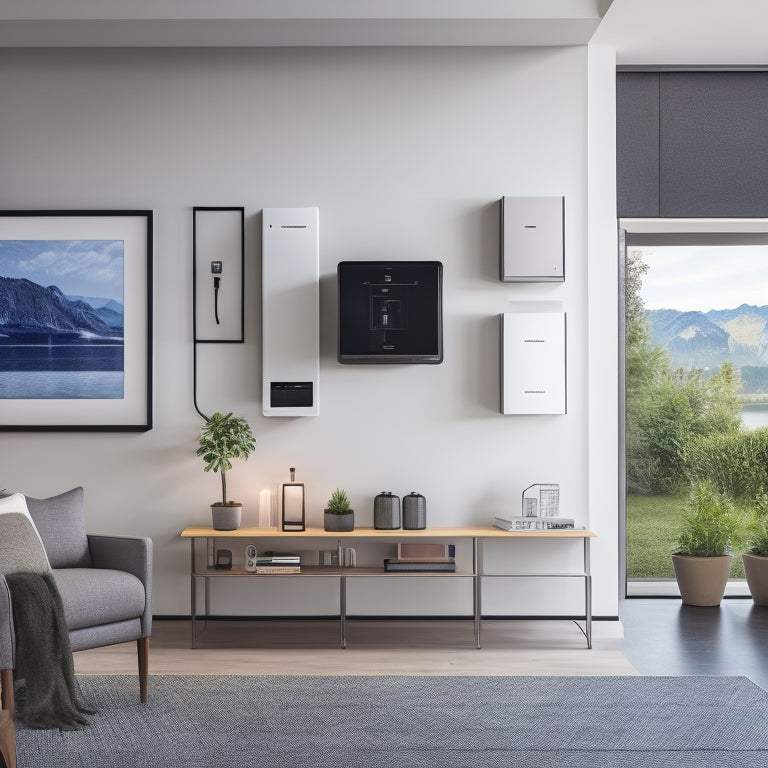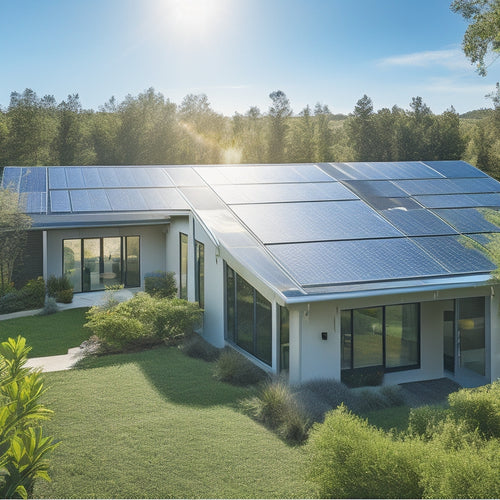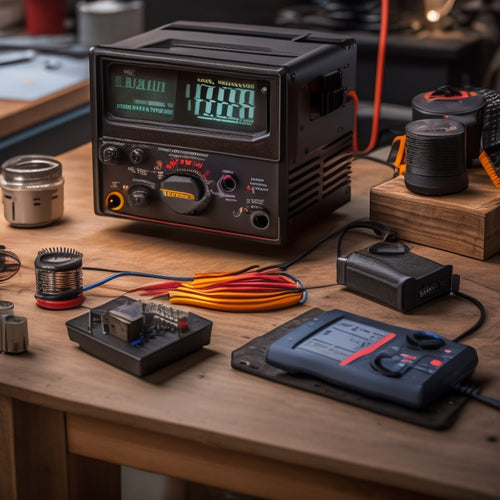
5 Best Home Energy Storage Batteries
Share
You're in the market for the top home energy storage batteries that can efficiently store excess energy generated by your solar panels or grid, and provide a reliable backup during power outages. Lithium-ion batteries dominate the market due to their high energy density and long lifespan. When selecting a battery, consider key factors like system compatibility, available space, and electrical connections. Aligning system features with your energy needs and budget is essential. Look for high-depth-of-discharge ratings, warranty, and customer support for long-term satisfaction. As you investigate the best options, you'll want to uncover the technical details that set them apart.
Overview
- Lithium-ion batteries are a top choice for home energy storage due to their high energy density, long lifespan, and efficient performance.
- High-depth-of-discharge (DOD) ratings increase usable energy, and aligning system features with energy needs and budget is crucial for satisfaction.
- Tesla Powerwall and LG Chem RESU offer high-capacity storage options with efficient round-trip energy storage and release.
- Advanced smart charging capabilities and built-in monitoring features contribute to long-term battery performance and reliability during power outages.
- Regular maintenance is essential for optimal performance, and selecting systems with high round-trip efficiency minimizes energy losses during storage and release.
Top-Rated Energy Storage Systems
Three top-rated energy storage systems dominate the market, offering exceptional performance, reliability, and value for homeowners. You'll find that lithium-ion batteries are a popular choice, capitalizing on lithium-ion advantages like high energy density, long lifespan, and low maintenance.
When evaluating installation, you'll want to think about factors like system compatibility, available space, and electrical connections. Confirm your chosen system aligns with your energy needs and budget, and assess features such as capacity, voltage, and amp-hour ratings to meet your energy needs key features to evaluate.
Look for systems with high-depth-of-discharge (DOD) ratings for increased usable energy and examine monitoring and control capabilities for remote performance tracking and alerts. Look for systems with scalable designs, allowing you to add or remove batteries as needed.
Additionally, review the warranty and customer support offered by the manufacturer. By assessing these installation considerations, you'll be well on your way to utilizing the benefits of energy storage and achieving greater independence from the grid.
Best Battery for Solar Power
As you investigate top-rated energy storage systems, you'll likely want to pair your solar power system with a battery that optimizes its performance.
When it comes to solar power, a lithium-ion battery is an ideal choice due to its high efficiency and long lifespan. Lithium-ion batteries offer several advantages, including high energy density, low self-discharge rates, and a long cycle life, which can provide over 5,000 cycles of reliable energy storage.
They efficiently manage energy storage, allowing for the use of excess energy at night or during low sunlight conditions. This means you'll get the most out of your solar power system and enjoy reliable energy storage.
To guarantee your battery performs at its best, regular maintenance is essential. This includes monitoring the battery's state of charge, keeping it within the recommended temperature range, and performing software updates as needed.
High-Capacity Home Energy Solutions
Optimizing your home energy storage requires a system capable of handling high-capacity energy demands. You'll need a solution that can efficiently store and distribute power to meet your household's unique needs.
When selecting a high-capacity home energy solution, consider affordable options that won't break the bank. Look for systems with scalable battery configurations, allowing you to add or remove units as your energy demands change. For instance, the Tesla Powerwall residential battery systems offers a capacity of 13.5 kWh, making it a suitable option for high-capacity energy storage.
Additionally, consider systems with high round-trip efficiency, such as the LG Chem RESU, which boasts an efficiency of up to 95%.
Installation considerations are also essential, as improper setup can lead to reduced system performance and lifespan. Ascertain your chosen solution can be easily integrated with your existing solar panel or grid connection, and that the installation team has experience with high-capacity systems.
Most Efficient Energy Storage Options
When it comes to maximizing your home energy storage system's performance, selecting the most efficient energy storage options is crucial.
You want to confirm that your system can store and release energy effectively, minimizing losses and optimizing your energy capacity. Different storage technologies have varying levels of efficiency, so it's important to choose the right one for your needs.
Look for options with high round-trip efficiency, which measures the amount of energy retained after charging and discharging.
Lithium-ion batteries, for instance, boast high round-trip efficiency rates, making them a popular choice for home energy storage systems.
Long-Lasting Battery Backup Systems
Your home energy storage system's reliability hinges on long-lasting battery backup systems that can provide power during outages and emergencies. A long-lasting system guarantees you have a steady supply of energy when you need it most.
Look for batteries with advanced smart charging capabilities to optimize battery longevity. This technology helps prevent overcharging, which can reduce the lifespan of your batteries.
Additionally, consider systems with built-in monitoring and maintenance features to identify potential issues before they become major problems.
Frequently Asked Questions
Can I Use Energy Storage Batteries for My RV or Boat?
You can definitely use energy storage batteries for your RV or boat, exploring RV battery options and boat power solutions that provide reliable, off-grid freedom, allowing you to venture further, longer.
Do Energy Storage Batteries Qualify for Federal Tax Credits?
You're wondering if you can cash in on federal incentives for going green - and rightly so! As it turns out, energy storage batteries do qualify for tax eligibility, providing you with a sweet 26% credit on your installation costs.
Are Energy Storage Batteries Safe for Indoor Installation?
When considering indoor installation, you'll want to prioritize safety; look for batteries with built-in safety features, follow installation guidelines, and guarantee proper ventilation to minimize risks, giving you peace of mind and energy independence.
Can I Monitor My Energy Storage System Remotely?
As you traverse the online environment, you're just a click away from unfastening total control; with remote monitoring, you'll utilize the power to optimize your energy management, freeing you to make informed decisions and reign supreme over your energy independence.
Will Energy Storage Batteries Work During a Power Outage?
During a power outage, you'll be glad to know that your energy storage system can kick in, providing backup power; its battery performance, however, may vary depending on factors like depth of discharge and charge cycles.
Ready to Buy
You've narrowed down the top-rated energy storage systems, but the real question is: which one will you choose? Will it be the best battery for solar power, a high-capacity home energy solution, or the most efficient energy storage option? The decision is vital, as it'll impact your energy independence and savings. As you weigh your options, remember: the right battery can be a transformative factor. The future of your home's energy is in your hands - make it count.
Related Posts
-

Is Switching to Green Energy Solutions Easy
Switching to green energy solutions isn't just easy; it's also beneficial. You can greatly cut utility costs and enjo...
-

Installing Metal Solar Roofs for Maximum Energy Efficiency
Installing metal solar roofs can drastically enhance your home's energy efficiency and durability. These roofs withst...
-

Key Features of a DC to AC Converter
A DC to AC converter features high efficiency and conversion rates, which reduce energy costs and improve performance...


